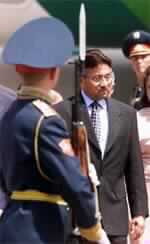HIGHLIGHTS: CICA & International Community Hope to Put an End to Brinkmanship||Spotlight on Putin||In Retaliatory Attacks, Pakistan Killed & Wounded 35 Indians Monday||STORY: Indian Prime Minister Atal Behari Vajpayee and Pakistan's President Pervez Musharraf, their nuclear-armed countries on the brink of war, attend a forum together on Tuesday amid doubt they would meet face to face. (Read Photo caption)
Musharraf has said he wants such a meeting, but Vajpayee says none is planned.
Former Soviet Kazakhstan hosts the 16-nation Conference on Interaction and Confidence-building Measures in Asia (CICA), and visiting world leaders hope it will help put an end to the brinkmanship between India and Pakistan.
The international community has launched a coordinated effort to prevent a further escalation over Kashmir, a mountainous territory at the root of two of the three Indian-Pakistani wars since independence from Britain in 1947.
U.N. Secretary-General Kofi Annan said on Monday he hoped the meetings in Almaty would "take us away from the brink."
Secretary of State Colin Powell said he was pleased India and Pakistan recognized the "horrible" dangers of using nuclear weapons, and insisted Washington would maintain its diplomatic pressure to keep them from war.
Russian President Vladimir Putin and Chinese President Jiang Zemin both plan to meet Musharraf and Vajpayee.
The spotlight will be on Putin, who has received backing from the United States and European leaders for mediation efforts.
The Russian president arrived early on Tuesday. On Tuesday afternoon he is due to meet Musharraf in a lavish residence in the foothills of the magnificent Tien Shan mountains. Just half an hour later, he is to see Vajpayee.
Russia enjoys traditionally warm ties with India, while China has close relations with Pakistan.
DECADES OF CONFLICT
But the odds of a breakthrough are steep.
The leaders last exchanged a cursory handshake and a few words in Nepal in January.
Musharraf has repeatedly expressed his readiness for talks with Vajpayee, to which his Indian counterpart told reporters before leaving India for Kazakhstan: "There is no such plan."
Vajpayee on Monday blamed "border terrorism" for whipping up tension in South Asia and said he was glad the Almaty summit would adopt a declaration condemning international terrorism.
He did not name Pakistan, nor did he say if a meeting with Musharraf was possible, but Delhi has said it wants to see firm evidence that Pakistan has curbed infiltrations by militants before it agrees to such talks.
Pakistan has tried to portray India as obstructing dialogue.
Asked on Monday under what conditions he would be willing to talk to Vajpayee, Pakistan's military ruler replied: "Unconditional. You need to ask that question to Prime Minister Vajpayee. I have no conditions."
Pakistan said on Monday its troops hit Indian military installations in retaliatory firing across the tense disputed border in Kashmir, killing and wounding at least 35 soldiers.
India did not report any casualties.
The old foes have deployed about a million troops poised for war along the border since a raid on India's parliament in December that New Delhi also blamed on Pakistan-based militants.
PHOTO CAPTION
Pakistani President Pervez Musharraf arrives at Almaty airport, June 3, 2002. India and Pakistan came under increased pressure to defuse a crisis that has brought the nuclear-armed rivals to the brink of war as their leaders found themselves in the same city for an Asian security summit. (Sergei Karpukhin/Reuters)
- Author:
& News Agencies - Section:
WORLD HEADLINES


 Home
Home Discover Islam
Discover Islam Quran Recitations
Quran Recitations Lectures
Lectures
 Fatwa
Fatwa Articles
Articles Fiqh
Fiqh E-Books
E-Books Boys & Girls
Boys & Girls  Hajj Rulings
Hajj Rulings Hajj Fatwas
Hajj Fatwas














